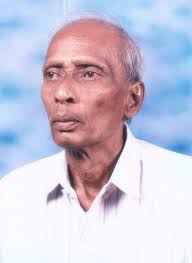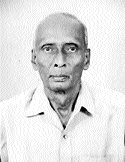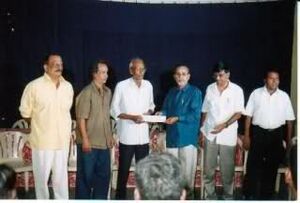C. Mani
இந்தப் பக்கத்தை தமிழில் வாசிக்க: சி.மணி
C. Mani (1936 - 2009) was a poet who wrote Revival Poetry (Pudhu Kavithai) and essays on poetry in Tamil. He is considered one of the pioneers of Modern Tamil poetry. He was a poet who emerged from Ezhuthu Magazine and later ran a zine named Nadai.
Birth, Education
C. Mani's given name is C. Palanisamy. He was born in 1936 in Salem.
Personal Life
C. Mani worked as an English professor.
Literary Life
C. Mani was greatly fascinated by the thoughts of T.S. Eliot. He was actively involved in the discussions of the concepts of the Revival Poetry when the Ezhuthu magazine was launched in 1959. His poems were also published under the name C. Palanisamy. The poem Gugai (The Cave), was published under the name C. Mani, and caught the readers’ attention. C. Mani, who continued to write poems, wrote a long poem called Naragam (The Hell) in 1962 under the influence of T.S Elliott's The Waste Land[1]. Ezuthu magazine described it as an achievement in Tamil. In his Nadai magazine, in an article entitled Yappum Kavithaiyum (Meter and Poetry), he wrote extensively on the meter of modern poetry and its relationship to the poetic tradition.
Journalism
In 1968-1969, C. Mani and friends ran a magazine called Nadai in Salem.
Literary Significance
C. Mani was one of the pioneers of the Thamizh Pudhu Kavithai Iyakkam (Tamil Revival Poetry Movement). He wrote during a period when poetry moved from metered verse to free verse. He was in discussion with N. Pichamoorthi, Si.Su. Chellappa and Ka.Naa. Subramanyam who wanted to create a theoretical background for the Revival Poetry in order to sustain the new form. C. Mani was the author of the first study of Revival Poetry, Yappum Kavithaiyum. He proved that though one can establish the Revival Poetry as one that is free of meter, one can still see the continuity of the traditions of poetry in it. He presented it not only as a concept but also with creative evidence. Sukumaran mentions that C. Mani reworked the style of the traditional poem in the new form when many of his predecessors used prose language for poetry.
Awards
- M. Karunanidhi Porkizhi award.
- Tamil University Translation Award 1983, 1985.
- Aasan Poetry award.
- Poet Sirpi award.
- Vilakku literary award 2002
Works
Poetry
- Varum Pogum
- Olicherkkai
- Idhuvarai
- Nagaram
- Pachaiyin Nilavuppen
- Nattiyakkalai
- Uyarkudi
- Alaivu
- Gugai
- Theervu
- Mugamoodi
- Pazhakkam
- Paari
Poetics
- Yappum Kavithaiyum
Translation
- Bouddham
- Thondu kinarum Amaippum
- Tao Te Zing
References
- எழுத்தும் நடையும் - சி.மணி, கால சுப்பிரமணியம் - மணல்வீடு | panuval.com
- writermaanee: சி.மணி
- சி.மணி பற்றி சிறகு இதழ்
- பிரமிள்: சி.மணி கவிதைகள்
- கவிஞர் சி.மணி :அஞ்சலி | எழுத்தாளர் ஜெயமோகன்
- கவிதை மீதொரு உரையாடல்: சி.மணி - யார் அந்த மனிதன்? | கவிதை மீதொரு உரையாடல்: சி.மணி - யார் அந்த மனிதன்? - hindutamil.in
- சி.மணி வெங்கட் சாமிநாதன்
- சி. மணி பற்றிய சில கனிந்த நினைவுகள், வைதீஸ்வரன், திண்ணை.காம், 2004
சி. மணி பற்றிய சில கனிந்த நினைவுகள் | திண்ணை]
Notes
Ready for review en
Please do not write any content below this line. This section is only for editing templates & categories.



